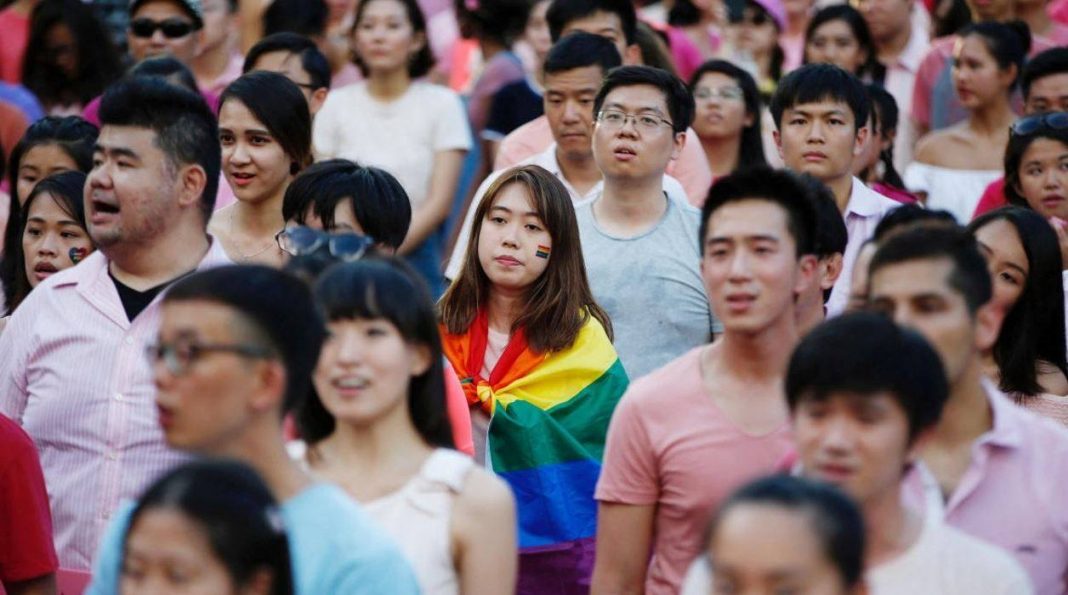Although Singapore made the announcement on Sunday that it would be repealing a legislation that criminalises gay sex, homosexuality is still illegal in a large number of other areas of the globe and is occasionally subject to the death penalty.
According to a study that was issued in the year 2020 by the International Lesbian, Gay, Bisexual, Trans and Intersex Association (ILGA), homosexuality is illegal in 69 nations, including 11 countries where it is a capital offence and may result in one’s execution.
There are around 30 nations in Africa that have laws against homosexuality, and Mauritania, Somalia, and Sudan all have laws that carry the death sentence for same-sex relationships.
Legalization of homosexual marriage only occurred in South Africa in 2006, making that country the only one on the African continent to do so.
Angola, Lesotho, Mozambique, and the Seychelles are among the few nations in which homosexual acts in the bedroom are no longer considered illegal.
After a momentous decision was handed down by Taiwan’s Constitutional Court in 2017, Taiwan became the first country in the region to legalise gay marriage. This is despite the fact that most of Asia is accepting of homosexuality.
In 2015, Vietnam made it lawful for homosexual couples to celebrate their marriages, but the country did not go so far as to fully recognise same-sex marriages. When MPs in Thailand granted their preliminary assent in June to legalising same-sex partnerships, the country moved a step toward full legalisation of same-sex marriage. The practise of homosexuality was made legal in India by the Supreme Court in the year 2018.
Marriages between gay couples and gay adoptions are legal in both New Zealand and Australia.
In 2001, the Netherlands made history by becoming the first nation in the world to legalise the union of homosexual couples.
Since that time, 17 countries throughout Europe have followed suit, including Austria, Belgium, Britain, Denmark, Finland, France, Germany, Iceland, Ireland, Luxembourg, Malta, Norway, Portugal, Spain, Sweden, Slovenia, and Switzerland.
Some nations, such as the Czech Republic, Croatia, Cyprus, Estonia, Greece, Hungary, and Italy, are the only ones that let gays and lesbians to form civil unions.
Before 1993, homosexuality was treated as a crime in Russia, and it wasn’t classified a mental disease until 1999. Although homosexuality is now legal, a regulation passed in 2013 makes it illegal to encourage homosexuality among anyone under the age of 18.
A rule that was enacted in Hungary in 2021 made it a crime to “promote” homosexuality or gender transition to those who were under the age of 18. There are a handful of nations that recognise the legitimacy of same-sex adoptions.
There are twelve nations in Europe that have legalised assisted reproduction for lesbian couples.
In 2005, Canada became the first country in North America to legalise same-sex marriage and adoptions. Ten years later, in 2015, the United States legalised gay marriage across the country.
Marriages between people of the same gender are legal in Argentina, Brazil, Colombia, Ecuador, Costa Rica, Chile, and Uruguay in Latin America.
In 2007, the federal capital of Mexico became the first city in the area to legalise homosexual civil unions, and in 2009, it legalised gay weddings. A little less than half of the nation’s 32 states have done the same.
In September, Cuba will conduct a vote to decide whether or not to approve a revised family law, which would include the first-ever legalisation of marriage between people of the same sexual orientation.

